|
De Spaanse schrijver Eduardo Mendoza werd geboren in Barcelona op 11 januari 1943. Zie ook mijn blog van 11 januari 2007 en ook mijn blog van 11 januari 2008 en ook mijn blog van 11 januari 2009 en ook mijn blog van 11 januari 2010.xml:namespace prefix = o ns = "urn:schemas-microsoft-com:office:office" />
Uit: Niemand im Damensalon (Vertaald door Peter Schwaar)
Nach neun Tagen kam sie wieder, mit denselben Beinen. Wortlos setzte sie sich auf den Sessel, wies mit einer Handbewegung den Frisiermantel zurück und sagte, mir fest in die Augen blickend:
"Ich bin nicht wegen meiner Haare gekommen, sondern um mit dir über eine persönliche Angelegenheit zu sprechen. Macht es dir etwas aus, wenn ich dich duze? Das ist nur logisch in Anbetracht des persönlichen Charakters der Angelegenheit, auf die ich eben angespielt habe. Aber vorher muss ich wissen, ob ich für diese persönliche Angelegenheit und alle sich daraus ergebenden Konsequenzen auf dich zählen kann."
"Ich werde tun, was in meiner Macht liegt," antwortete ich, "vorausgesetzt, es ist nicht unvereinbar mit der Ethik der Coiffure."
"Ich habe keine andere Antwort erwartet. Aber wir unterhalten uns besser nicht hier. Es kann jemand reinkommen und uns bei unserer Fühlungnahme stören. Wann hast du Feierabend?"
"Ein guter Friseur hat nie Feierabend, aber der Damensalon schließt um acht."
"Um diese Zeit erwarte ich dich in der Kneipe gegenüber. Versetz mich nicht."
Zur vereinbarten Stunde erschien ich zu unserer Verabredung. Sie war bereits dort, an einem Tisch im Hintergrund ins Einsaugen eines (vom Kellner der Kneipe) in eine Flasche abgefüllten Erfrischungsgetränks versunken, gleichgültig gegenüber allem um sie herum. Wortlos deutete sie auf den Stuhl. Ich setzte mich. Eine Weile schwiegen wir, sie dachte an ihre Dinge, und ich dachte ebenfalls an ihre Dinge. Das erlaubte mir, sie etwas aufmerksamer zu betrachten, so dass ich dem Leser eine nachträgliche Beschreibung liefern kann - auf ihre untere Hälfte bin ich ja schon andernorts zu sprechen gekommen.
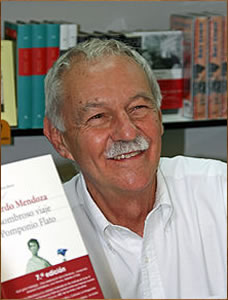
Eduardo Mendoza (Barcelona, 11 januari 1943)
De Amerikaanse schrijfster Diana Gabaldon werd op 11 januari 1952 geboren in Williams, Arizona. Zie ook mijn blog van 11 januari 2009 en ook mijn blog van 11 januari 2010.
Uit: Laoghaire (Book Seven, Outlander)
He rode slowly past the loch, thinking that this visit was a mistake. It was possible to leave things behind--places, people, memories--at least for a time. But places held tight to the things that had happened in them, and to come again to a place you had once lived was to be brought face to face with what you had done there, and who you had been.
Balriggan, though...it hadn't been a bad place; he had loved the wee loch, and the way it mirrored the sky, so still some mornings that you felt you might walk down into the clouds you saw reflected there, feeling their cold mist rise up about you, to wrap you in their drifting peace. Or in the summer evenings, when the surface glimmered in hundreds of overlapping rings as the hatch rose, the rhythm of it broken now and then by the sudden splash of a leaping salmon.
The road took him closer, and he saw the stony shallows where he'd shown wee Joan and Marsali how to guddle fish, all three of them so intent on their business they'd paid no heed to the midgies biting, and gone home wet to the waist and red with bites and sunburn, the wee maids skipping and swinging from his hands, gleeful in the sunset. He smiled just a little--then turned his horse's head away, up the hill to the house.
The place was shabby, but in decent repair, he grudgingly noted. There was a saddle-mule browsing in the paddock behind the house, elderly, but sound-looking. Well enough. Laoghaire wasn't spending his money on follies or a coach-and-four, at least.
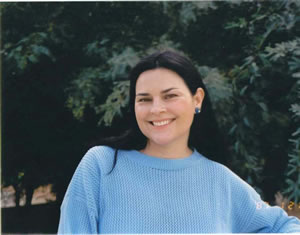
Diana Gabaldon (Williams,11 januari 1952)
De Macedonische dichter en schrijver Slavko Janevski werd geboren op 11 januari 1920 in Skopje. Zie ook mijn blog van 11 januari 2009 en ook mijn blog van 11 januari 2010.
Uit: The Drowned Man (Vertaald door Zoran Anchevski)
Never before, in the long chain of their years, had the twelve elders sitting in front of their houses seen a drowned man floating in the calm waters of the lake, gliding to the shore, coming to rest on the wet sand, and as is the case with the dead, prone, motionless, barefoot.
Probably because of the heat with which even June is generous, the arrival of the corpse caused no great stir in the fishing village. Most men and women were behind the walls of their houses. There were no children. However, in a little while, a few young men, fearing some misfortunean investigation, a hearing, suspiciongathered around the drowned man and realized immediately that he was not a local, not from their side of the lake. His clothes of thin white linen seemed too big for him. The drowned man had fragile bones and was not swollen or blue. He seemed to be asleep in the rainabout to wake up.
With some concern that what he was doing was illegal, one of the fishermen knelt beside the corpse and removed some weed or grass from his face. From the incomplete frame of the gently curved eyebrows two eyes gazed at the fishermen. But what eyes! As if alive! Saved from the layers of murky slime the pupils shrank. The man kneeling by the corpse straightened up. He took a step back but said nothing. The others were also silent. As if they had always known what to do in such situations, as if rituals were a part of their lives, they raised the drowned man from the wet sand. They laid him gently in a wooden boat. Two of them, paler than before, rowed out to the middle of the lake. The watchers on the shore remained silent. They waited in a huddle, indistinguishable one from another, with set white faces.
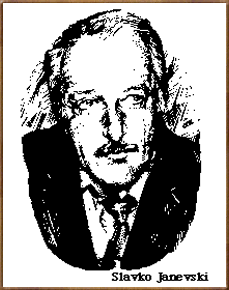
Slavko Janevski (11 januari 1920 20 januari 2000)
De Duitstalige, joodse, dichteres en schrijfster Ilse Weber werd geboren op 11 januari 1903 in Witkowitz, Tsjechoslowakije. Zie ook mijn blog van 11 januari 2009 en ook mijn blog van 11 januari 2010.
Ade, Kamerad,
hier teilt sich der Pfad,
denn morgen mussi ch fort.
Ich scheide von dir,
man treibt mich von hier,
ich geh mit dem Polentransport.
Du gabst mir oft Mut,
treu warst du und gut,
zum Helfen immer bereit.
Ein Druck deiner Hand
Hat die Sorgen gebannt,
wir truce gemeinsam das Leid.
Ade, Kamerad,
um dich ist es schad,
der Abschied wird mir schwer.
Verlier nicht den Mut,
ich war dir so gut,
jetzt sehn wir uns nimmermehr.
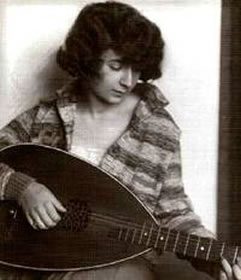
Ilse Weber (11 januari 1903 6 oktober 1944)
De Zuidafrikaanse schrijver en politicus Alan Stewart Paton werd geboren op 11 januari 1903 in Pietermaritzburg. Zie ook mijn blog van 11 januari 2009.
Uit: Cry The Beloved Country
This is no time to talk of hedges and fields, or the beauties of any country. Sadness and fear and hate, how they well up in the heart and mind. Cry for the broken tribe, for the law and the custom that is gone. Aye, and cry aloud for the man who is dead, for the woman and children bereaved. Cry the beloved country, these things are not yet at an end. The sun pours down on the earth, on the lovely land that man cannot enjoy. He knows only the fear of his heart.
Have no doubt it is fear in the land. For what can men do when so many have grown lawless? Who can enjoy the lovely land, who can enjoy the seventy years, and the sun that pours down on the earth, when there is fear in the heart? Who can walk quietly in the shadow of the jacarandas, when their beauty is grown to danger? Who can lie peacefully abed, while the darkness holds some secret? What lovers can lie sweetly under the stars, when menace grows with the measure of their seclusion?
Some cry for the cutting up of South Africa without delay into separate areas, where white can live without black, and black without white, where black can farm their own land and mine their own minerals and administer their own laws. And others cry away with the compound system, that brings men to the towns without their wives and children, and breaks up the tribe and the house and the man, and they ask for the establishment of villages for the labourers in mines and industry.
And the churches cry too. The English-speaking churches cry for more education, and more opportunity, and for a removal of the restrictions on native labour and enterprise. And the Afrikaans-speaking churches want to see the native people given opportunity to develop along their own lines, and remind their own people that the decay of family religion, where the servants took part in family devotions, has contributed in part to the moral decay of the native people. But there is to be no equality in church or state.
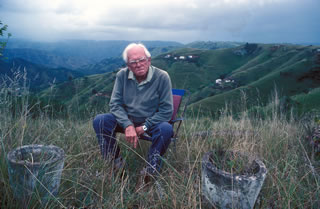
Alan Stewart Paton (11 januari 1903 12 april 1988)
De Amerikaanse dichter, criticus, vertaler en reisschrijver Bayard Taylor werd geboren op 11 januari 1825 in Kennett Square in Chester County, Pennsylvania. Zie ook mijn blog van 11 januari 2009.
Bedouin Song
FROM the Desert I come to thee
On a stallion shod with fire;
And the winds are left behind
In the speed of my desire.
Under thy window I stand,
And the midnight hears my cry:
I love thee, I love but thee,
With a love that shall not die
Till the sun grows cold,
And the stars are old,
And the leaves of the Judgment Book Unfold!
Look from thy window and see
My passion and my pain;
I lie on the sands below,
And I faint in thy disdain.
Let the night-winds touch thy brow
With the heat of my burning sigh,
And melt thee to hear the vow
Of a love that shall not die
Till the sun grows cold,
And the stars are old,
And the leaves of the Judgment Book Unfold!
My steps are nightly driven,
By the fever in my breast,
To hear from thy lattice breathed
The word that shall give me rest.
Open the door of thy heart,
And open thy chamber door,
And my kisses shall teach thy lips
The love that shall fade no more
Till the sun grows cold,
And the stars are old,
And the leaves of the Judgment Book Unfold!
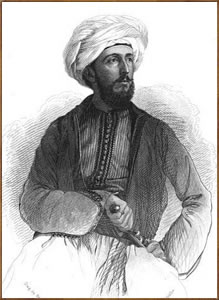
Bayard Taylor (11 januari 1825 19 december 1878)
|



